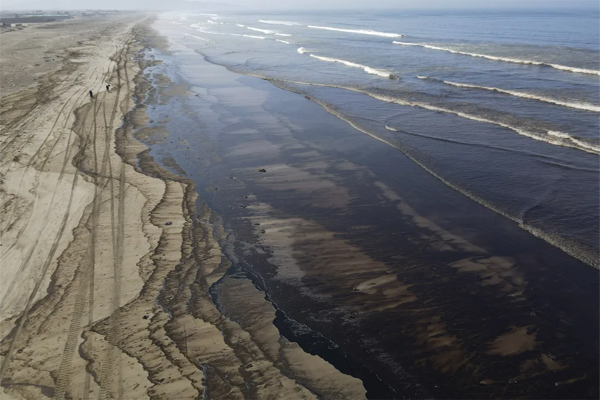
Unusually high waves caused by the eruption of an underwater volcano in Tonga last weekend caused an oil spill at a refinery in Peru that the government qualified as an “ecological disaster” yesterday. The foreign ministry said that the oil spill had harmed animal and plant life in protected zones over a combined area of some 18,000 square kilometers around islands and fishing regions.
Peruvian authorities say the spill inflicted “serious harm to hundreds of fishermen’s families” and had “put in danger the flora and fauna” in two protected natural areas. Peru has demanded compensation from the Spanish oil giant Repsol which operates the refinery where the spill occurred while a tanker was unloading crude. Peru’s prime minister, Mirtha Vásquez, told journalists that the Pampilla refinery “apparently” did not have a contingency plan for an oil spill.
Environmental groups have criticized the company’s response, as well as that of the Peruvian authorities. The oil was spreading along Peru’s Pacific coast affecting seabirds, seagulls, terns, sea lions, otters and dolphins, Oceana Peru said in a tweet.
Juan Carlos Riveros, biologist and scientific director in Peru of Oceana said that the species most affected by the spill include guano birds, seagulls, terns, tendrils, sea lions and dolphins.
La Pampilla is Peru’s largest refinery and supplies more than half of the local fuel market.
(Reuters, Guardian, Associated Press)
More Peru
- Powerful figures in Peru are using the judicial system to intimidate and silence critical journalists, reports the New York Times. While the trend is regional, it is particularly strong in Peru, where defamation is a criminal offense.
- The latest poll conducted by Ipsos and El Comercio shows that Pedro Castillo’s approval rating continued to slip at the start of this month. 33 percent of respondents approved of the President in January, while 60 percent disapproved — Latin America Risk Report.
News Briefs
Barbados
- Barbados Prime Minister Mia Mottley won a second term in elections yesterday, in which her Barbados Labour party won all 30 seats, up from 29 in 2018. She gained international fame last year with an incendiary speech at COP26, urging leaders to stand up to the challenge of climate change. She also oversaw Barbados’ transition to a full republic last year. (Guardian)
Haiti
- The situation in Haiti has reached a crisis point, as gang violence has surged across the country in the wake of President Jovenel Moïse’s assassination last July. International observers are raising concerns that February 7 – the date Moïse’s term would expire – could bring more violence and further complicate the country’s political transition, reports Al Jazeera.
Brazil
- Rio de Janeiro’s state government launched a heavily armed police operation in one of Rio’s largest favela’s, Jacarezinho, the start of what authorities are touting as an effort to wrest back control from the drug gangs and paramilitary mafias in swathes of the city. Other communities will reportedly be occupied in the coming days, but experts are skeptical the approach will be effective, reports the Guardian.
- Former Brazilian president Luiz Inácio Lula da Silva said that reducing poverty and inequality should be prioritized over fiscal discipline. (Reuters)
Guatemala
- Taiwan has paid for a lobbying contract to promote Guatemala with U.S. officials, Guatemala’s government said this week. The move comes as China’s efforts to strengthen its diplomatic foothold in Central America are advancing, notes Reuters.
Migration
- Guatemalan authorities said they sent back more than 600 migrants — mainly from Honduras and Nicaragua — who entered the country through border posts with Honduras in a U.S.-bound caravan. (Reuters)
Ecuador
- Ecuador will ask its citizens to vote in a 2023 consultation to reform its justice system, announced President Guillermo Lasso. Ecuador is in the midst of a surge in violence, and last year Lasso declared a state of emergency that deployed troops to combat crime. Lasso reiterated his criticism of decisions and sentencing by judges which allow immediate freedom for detainees, reports Reuters.
Argentina
- Eduardo Levy Yeyati plumbs Argentina’s economic history for lessons applicable to its current predicament in Americas Quarterly.
- Nacla looks at how lithium mining in Argentina threatens local communities.
Costa Rica
- José Maria Figueres and Fabricio Alvarado, tied for first place in Costa Rica’s presidential race, with Lineth Saborio following close behind, according to a new poll conducted by Opol Consultores. Costa Rica will hold presidential elections on Feb. 6. (Latin America Risk Report)
Latin America Daily Briefing —
http://latinamericadailybriefing.blogspot.com












